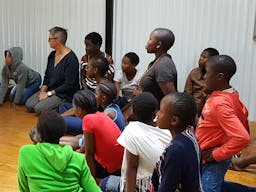Giving up on hope: taking back our power.
Apr 28, 2022
Story
When we got the government regulations for lockdown my partner and I got going with lists of things that we planned to do with the time now given to us, which almost seemed like a gift. As an artist I have always been frustrated with all the interruptions of daily life. Also busy with a PhD I thought I could catch up with my writing. But soon the implications of the reality of the virus became apparent. Included in this was the suffering of people living so close to me in the local township, where there is a huge hand-to-mouth existence anyway, many children and grandmother headed households due to HIV and Aids, and unemployment high. I plummeted into a despair that has an underlying eco-anxiety, that became an existential crisis, exacerbated by regulations being slowly lifted. The business-as-usual that was being posited as a new business-as-usual seemed, and still seems, to be not going to emerge in a way that will potentially save our beaten planet.
But I was pointed to an article that made sense. In it the author claims that we should give up on hope. This seems counter-productive on face value, but he says that holding onto hope means that we give over action to authorities. So for example, hoping that our post-apartheid government will change, stop corruption and fulfil the promises that gave us so much hope over twenty years ago, means that we are not proactive and simply sit and wait. Instead we should, according to him, stop hoping and start doing, and in that way give ourselves the power. This does not mean that as individuals we are in a position to solve all the ills of our local and global environments, but it does mean that we give ourselves the space to make differences where we can.
Themba, who is a young man who is starving, with the opportunities open to him usually having been cut off with the virus, comes to our gate on a regular basis. Now he is making eco-bricks for us, as part of an on-going project where the communities of all demographics here use non-recyclables to fill two litre cold drink bottles, which are then used to build with. As much as I have always felt very strongly about cleaning up the environment simply because we need and want a clean environment, instead of for cash, for as little as R10 per eco-brick, (which equates to less than $1 I believe), Themba is working. He has purpose and is doing good work for the environment too, plus he is eating. We cannot sustain his support indefinitely, since cash flow is tight for us too, but there are ways to promote the project in ways that we had not thought of before.
Still, I worry about the children who are my research participants, as they sit in their homes unable to attend school as yet, in the township where face masks are a thing of the past already, and people are going about their lives as if nothing has happened. But I have to trust, and there is a big difference between hope and trust, although I cannot as yet place my finger on what exactly this is. At least they are being fed, as we have a number of programmes here that are ensuring that food is distributed regularly. Fortunately, we live in a small village in a province that has the lowest statistics of corona, and crime is at a minimal. Because of this it is easier to monitor the needs of those that have been compromised at this time, and it is important for us all here to focus on this and not to become despairing when thinking about the big cities where it is near impossible to help, and where crime is rising. Keeping away from social media and even the news for the most part, is healthy for me. I cannot face the challenges that others are experiencing in other parts of the world, without plummeting into a despair of inability to help. War zones and refugee camps come to mind right now.
The waiting game, which is what this virus has forced us into: waiting for infections to lift, waiting for regulations to ease, waiting for life to normalise, is what is doing our heads in, on a global stage, in my opinion. Other waiting games are being exacerbated as well. A dear friend was diagnosed with a galloping and inoperable brain tumour just as we went into lockdown. The cruelty of the tumour is only one part of the picture. Her husband had to cross a provincial border to take her to hospital, and on admission, he was sent to the finance department for a signature. When he returned to admissions his wife had been taken to the wards, and he was not permitted to say goodbye. For weeks he sat at home, alone, waiting for news, with his friends unable to visit and give him the support he needed. Waiting for doctors to make a decision on treatment, waiting for test results, waiting, waiting - the whole world waits, and all we have is hope. In this there is very little means of empowerment as I mentioned previously, but for the small things we can do in the small spaces presented to us.
Almost all of my friends and family, including the parents of my dear research participants, say, "I am so grateful that.... At least we have... imagine if we were somewhere else where they have nothing..." This is humbling in that many of these people live in tiny homes with no electricity, and winter is upon us. Humbling for me too, are the stories presented here in this forum, and for this I am so immensely grateful. We all have a story; even if our stories come from very privileged positions.




